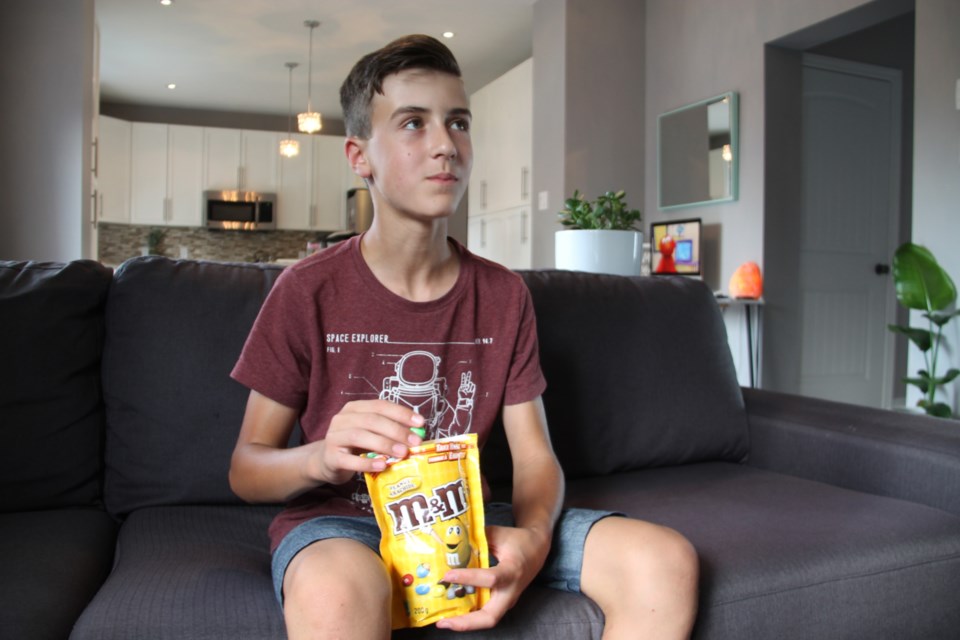SAULT STE. MARIE - At one time, Lennon Turco, like many other Canadians, lived in fear of accidentally consuming foods containing peanuts and being sent into anaphylaxis.
Anaphylaxis is a serious allergic reaction which causes an itchy rash, throat or tongue swelling, shortness of breath, vomiting, lightheadedness, low blood pressure and even death.
Now, thanks to treatment received in a clinical trial, Lennon, 12, can happily chomp on M&M's candy (there is approximately .46 of an ounce of peanuts in a bag of M&M’s), able to consume the equivalent of one peanut a day.
Lennon was 18 months old when it was discovered he was allergic to peanuts, said his mother Michelle Tuckett.
“It was through skin contact. He had some peanut butter on his skin and he ended up with huge hives, so he got tested locally and they told us he had an anaphylactic allergy to peanuts.”
“From there the treatment was just mainly strict avoidance of peanuts, we had EpiPens (hand-held epinephrine autoinjectors carried by those who have severe allergies) everywhere we went,” Michelle said.
“Then I heard about an allergy patch clinical trial study from DBV Technologies in France, but that study was completely full, they weren’t recruiting for that study, but they referred us to another clinical trial at Dr. Gordon Sussman’s office in Toronto. He’s an allergist who recruits for another study in North America for Aimmune Therapeutics (based in California).”
“It’s oral immunotherapy, a powder, which changes your immune system. It slowly introduces tiny doses of peanut protein until you get to the point where your immune system is changed, essentially,” Michelle said.
Lennon was the only person outside the Greater Toronto Area (GTA) able to participate in the clinical trial.
“I took the powder mixed with apple sauce, pudding…I feel good,” Lennon told SooToday.
“As I started I had some reaction, like an itchy throat or itchy nose, but then I could take it with no reaction at all.”
“I still carry an EpiPen, but I don’t know if I’ll have to use it,” Lennon said.
Lennon began the clinical trial in July 2017, travelling to the Sussman clinic in Toronto with his parents every two weeks for a six-month period, then monthly, and finally every three months, with his final visit taking place in May.
With the powder, Lennon started consuming one milligram of a peanut (one peanut being 300 milligrams) every day.
Every time the dosage was increased, Lennon was monitored at the Sussman clinic.
By May of this year, he was able to consume 4,000 milligrams, the equivalent of 13 peanuts, now eating one actual peanut a day to maintain his progress.
“They’re pretty cautious with using the term ‘healed,’ but they’re confident he won’t react with anaphylaxis,” Michelle said.
“We were told under the age of 13 there’s a much better response because at that age your immune system is not so set in stone, but there’s still been some success with adults.”
Lennon’s progress will continue being monitored as time goes by, to see if he can eat more peanuts daily.
“It’s much more relieving, knowing if there was an accidental ingestion of peanuts that he’s not going to react,” said Steve Turco, Lennon's father.
“It was a big fear. He’s going away to university in a few years, and thinking about him dealing with a peanut allergy out of town would have been very worrisome for us as parents,” Steve said.
Michelle said the Aimmune Therapeutics drug used in the oral immunotherapy powder, known as AR101, will be reviewed for FDA approval in the U.S. in September, to be followed, it is hoped, by approval in Canada.
“When it goes to market it’ll be a big cost for people. For us, because it was a clinical trial, it was covered by the drug company, so we’re excited about that. But when it goes to market it’ll cost thousands of dollars...in the States it’ll probably be covered through insurance. We don’t know what Ontario’s going to do,” Michelle said.
According to stats in a 2018 study, about 2.5 million Canadians suffer from food allergies, or about 7.5 per cent of the population. Of that number, 1.93 per cent suffer from an allergy to peanuts.
Meanwhile, Lennon said he enjoys playing football, playing guitar and being the studious type.
“I’m going to try and get into the medical field, in radiology, diagnosing,” Lennon said, his scientific curiosity piqued by going through the clinical trial.
“It’s so exciting,” Michelle smiled.
- SooToday.com
